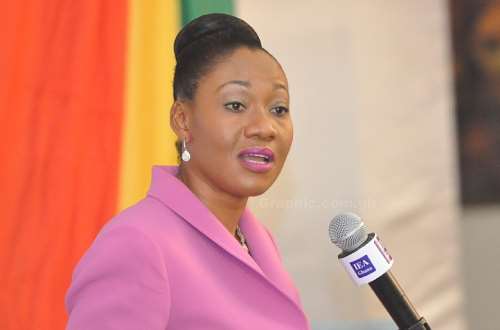The chairperson of the Electoral commission of Ghana Mrs Jean Adukwei Mensah’s plan to e cape from the court injunction is a threat to Ghana’s peace and democracy,the nation was abuzz with controversy when the Electoral Commission found itself embroiled in a court suit filed by the Minority and several other political parties. The issue at hand was the ongoing Limited Registration Exercise, which had ignited a fierce debate about its fairness and transparency.
The controversy began when the Electoral Commission decided to hold the Limited Registration Exercise exclusively at its district offices, rather than setting up registration centers in communities as it had done in previous elections. The rationale behind this decision was to streamline the process and reduce the possibility of fraudulent registrations.
However, the Minority and several opposition parties raised concerns about the accessibility of these district offices, arguing that they were not conveniently located for many citizens, especially those in rural areas. Accusations of voter suppression began to swirl, and soon enough, a court suit was filed to challenge the Electoral Commission’s decision.
As the court date approached, tension mounted within the Electoral Commission. The leadership found themselves caught between the need to defend their decision and the growing public outcry. They knew that the court suit would put their actions under intense scrutiny, and the consequences of an unfavorable ruling could be dire.
In a bid to avoid the court suit, the Electoral Commission initiated an elaborate behind-the-scenes maneuver. They secretly summoned representatives of the Minority and the political parties to a private meeting, hoping to reach a compromise. In the dimly lit room of a nondescript building, negotiations unfolded.
The Electoral Commission offered to open a limited number of registration centers in key urban areas to address the concerns of accessibility. They pledged to provide transportation for citizens who lived in remote areas, ensuring they could register without difficulty. It was a desperate attempt to avert the impending legal battle.
However, as the negotiations progressed, it became clear that the opposition parties were not willing to back down. They argued that a court ruling was necessary to set a precedent for future electoral processes and to ensure that the Electoral Commission operated within the bounds of the law.
Frustrated by the inability to reach a compromise, the Electoral Commission’s leadership decided to take an extraordinary step. They orchestrated a sudden vanishing act, closing the doors of their headquarters and district offices. The notice posted on the doors read, “Closed for Maintenance.”
The disappearance of the Electoral Commission sent shockwaves across the nation. It was an audacious move aimed at delaying the court hearing and buying more time to address the opposition’s concerns. The political landscape grew even more chaotic as the court suit was postponed indefinitely.
The vanishing act of the Electoral Commission made headlines globally, and the pressure continued to mount. Citizens, civil society organizations, and international observers called for transparency and adherence to the rule of law. The controversy cast a long shadow over Ghana’s political stability.
In the end, the Electoral Commission’s evasion of the court suit was a risky gambit. It served as a stark reminder of the importance of transparent and fair electoral processes in a democracy. As the nation awaited the resumption of the court hearing, it became clear that the vanishing act had only intensified the scrutiny on Ghana’s electoral system. The fate of the Limited Registration Exercise and the credibility of the Electoral Commission hung in the balance, as the nation grappled with the consequences of this high-stakes showdown.
story by: Odeneho Nana Kwaku Duah





